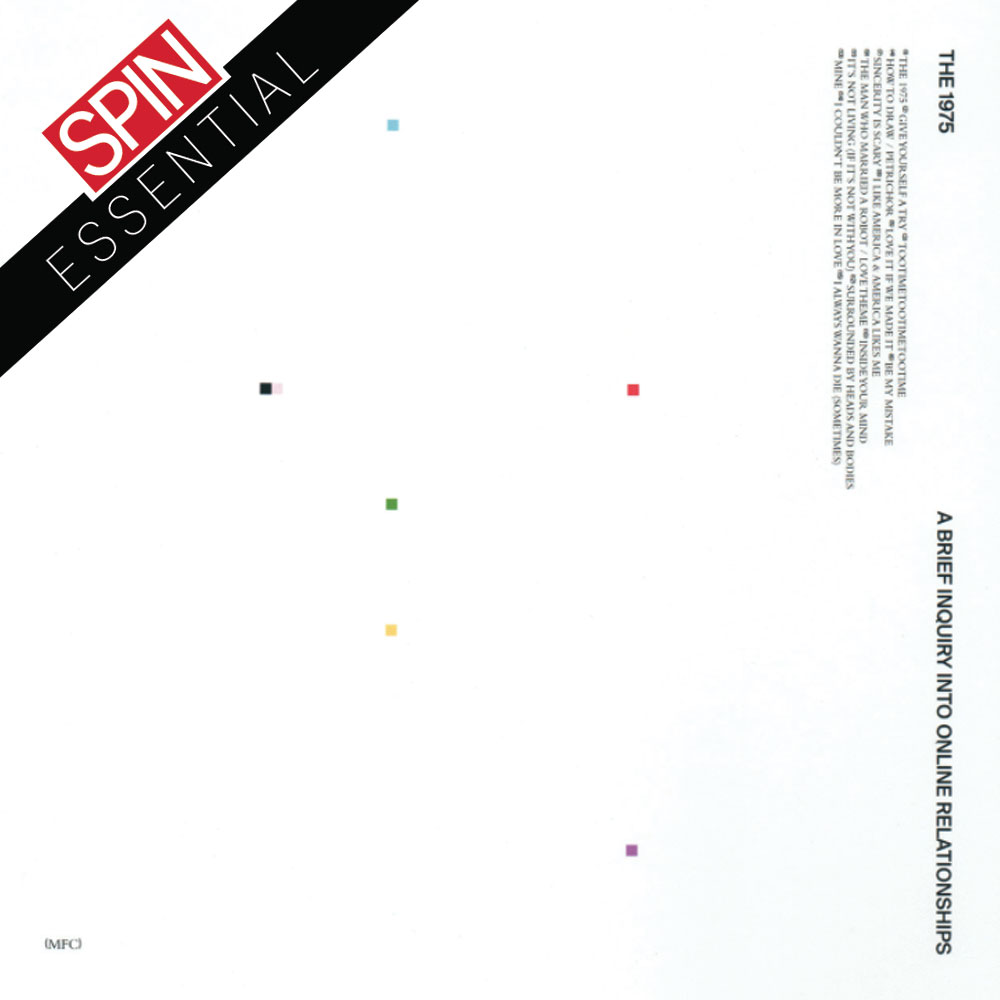“There are no big bands doing anything as interesting as us.” This Matt Healy heat check was plastered on the cover of Billboard this past August, and he has not shied away from repeating it in the lead-up to the 1975’s recently released third album. He’s got reason to be feeling himself. “Love It If We Made It,” their online-addled reboot of “We Didn’t Start the Fire,” is the first song to be written entirely in retweets, “The Man Who Married a Robot”—the album’s spoken-word cautionary tale of a man who falls in love with the internet—might be the first song to owe royalties to Siri, and get a load of the title: A Brief Inquiry into Online Relationships. Despite only recently being afforded artistic credibility, the 1975 explicitly courted accolades like “Anthem of our Time,” “the millennial answer to OK Computer,” “an undeniably 2018 vision of pop music”—and it actually worked. Brief Inquiry has been out for about a week, so the backlash would be starting… right about now if Healy hadn’t encoded it directly into the album itself. A Brief Inquiry asks What It All Means while questioning whether any band, let alone the 1975, have the right to tell us anything other than, “I don’t know…. It’s just a lot.”
The 1975 are just a lot. They make overwhelming albums about being emotionally and technologically overwhelmed. More than anything they’ve released to date, A Brief Inquiry Into Online Relationships is prone to maniacal ambition as well as crippling self-doubt and anxiety, obsessed with the granular details of social media etiquette while contemplating the benefits of going off the grid for a while, if not forever. This is a brief inquiry—58 minutes is not a lot to ask when you consider the scope of it all—but “I don’t know” serves as a mission statement rather than a copout to analytic paralysis. Healy probes everything about making music and consuming music in 2018 without resorting to cynicism or nihilism.
Yes, they’re bored by “rock music” imagery, stifled by its usage as a genre signifier, and still moved by it as a form of emotional communication. “I’m Jim Morrison. Am I Jim Morrison? I’m sorry that I’m Jim Morrison. I’m [expletive] Jim Morrison!” Healy joked in a recent interview; the 1975 pay direct homage to Ian Curtis and Thom Yorke, respectively a guy who wanted to be Jim Morrison and a guy who said it but definitely didn’t mean it. Healy has his issues with why the solo singer-songwriter is stereotyped as a gold standard for truth-telling. But his band knows they’re not above feeling crushed by a Damien Rice or Dashboard Confessional or Julien Baker song, and so here we have bedside acoustic weepers like “Be My Mistake” and “Surrounded by Heads and Bodies.” (What better way to express late night regret than while someone’s sleeping right next to you?) They brought in composer David Campbell to arrange strings for the closing imperial march “I Always Wanna Die (Sometimes),” and it’s telling Healy specifically namedropped Goo Goo Dolls’ “Iris” as an inspiration—though still subject to critical disdain as corporate alt-rock, the music from that era frequently confronted darkness within rudimentary electronic beats, glistening, gilded guitars, and karaoke-friendly hooks.
Though A Brief Inquiry is just as dizzying and disorienting as 2016’s heroically omnivorous i love it when you sleep, for you are so beautiful yet so unaware of it, the 1975 take themselves a little more seriously now. Two years ago, they blanched at being called a boy band while still engaging in the kind of symbiotic fan relationship endemic to that form: i love it was riddled with visual and lyrical Easter eggs, thumbing its nose at criticism and rewarding those who saw past it. Nothing here is quite as fearlessly saucy as that album’s lead single “Love Me” or audacious as its ambient midsection, and even the clunkiest lyrics aren’t a pile-up of car-krashian panache-in’. Though still endearingly schticky at points—Healy loves leaning on a gospel choir to hit the choruses—they stick the landing far more often. The band’s ambition and appetite is a matter of fact now, and the wow factor of “the 1975 made a Trippie Redd track” or “they think they’re George Michael” soon gives way to of course they did. “TOOTIMETOOTIMETOOTIME” could’ve been the frothiest trop-house deconstruction of IG infidelity on Scorpion and “It’s Not Living (If It’s Not With You)” could conceivably be covered as country, hair metal, or New Wave.
Still, their artistic growth hasn’t come at the expense of the seediness that makes the 1975 feel like an illicit pleasure even when Healy is trying to be the better man. Is he cerebral because he laces his lyrics with literary references, or is he basic because they happen to be Infinite Jest and Gone Girl, two tomes which are part of the pop canon in their own ways? Is he vapid because he quotes literally the first line of each, or is it a genius metacommentary on, say, the way people namedrop books they’ll never finish? Healy claims the video for “Sincerity Is Scary” is “wholesome as a bowl of soup” and perhaps it’ll distract from the twisted pre-chorus: “I’m sure that you’re not just another girl / I’m sure that you’re gonna say that I was sexist / I feel like you’re running out of all the things I liked you for.” This is the song that begs the listener to open themselves up to the possibilities of true IRL connection and I know that because “Sincerity Is Scary” received a thorough Artist Verified Genius commentary from Healy himself.
“Why would you believe you could control how you’re perceived / When at your best you’re intermediately versed in your own feelings?” he asks later on that song, maybe the only inquiry that needs to be made into online relationships. How often does your carefully curated persona misalign with your actual personality? How much suffering could you avoid if you gave up the game entirety? And why the hell should you believe Matt Healy when he offers the same alternatives to meaningless sex and screen time that you ignored from your parents: Honesty is the best policy, dare to be great, give yourself a try. It holds weight because the 1975 are living proof, even if he doesn’t always take his own advice. Try and find the earliest video of “Sex,” with their severe haircuts, black-and-white branding, and Johnny Cash posters. This was a group of young men trying so damn hard to be perceived as austere and cool, while critics claimed to see right through them. Six years later, the critics are on their side, and it doesn’t even really matter. The 1975 are still whoever the hell they want, and completely themselves.





